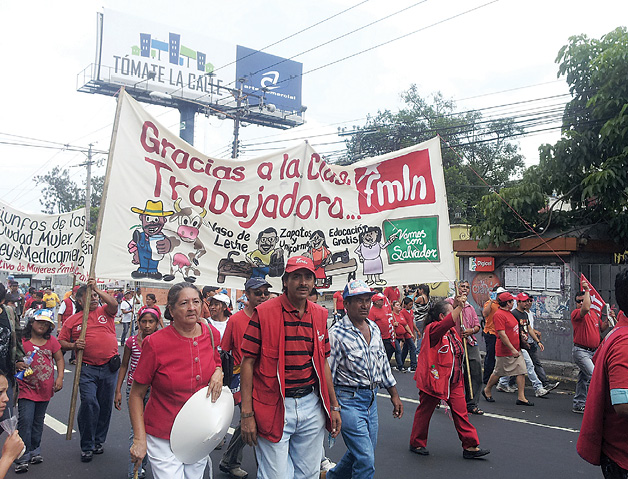Facing Repression, Salvadoran Workers Fight Privatization
May 1, 2016
Faced with a relentless push to privatize their jobs, port and airport workers in El Salvador have been fighting back and building international alliances to strengthen their movement.

in a 2013 May Day demonstration.
Magdalena Hernandez is a security specialist at the El Salvador International Airport and a member of the Industrial Union of Aeronautical and Connected Industries Workers of El Salvador (SITIAPES), which represents both public- and private-sector airport employees. They provide cargo, ground crew, janitorial, food and security services. In late March, Hernandez met with APWU officers to discuss their struggle.
In El Salvador, “Being a union member, especially a union leader, can be a death sentence,” she said. “Business owners hire hit men associated with gangs and organized crime to go after union leaders and threaten their lives, especially in the garment and apparel sector.”
The dangers are much greater for private-sector workers, she noted. “Public businesses fear international repercussions, and are looking out for their politics,” she explained.
“However, private businesses that have union workers don’t care about politics. They only care about profit. These are the same policies that affect workers in the U.S. It’s the same goal: Increase profit margins for big business and at the same time diminish conditions for workers.”
The 48 Percent
In 2001, the jobs of 48 percent of airport workers were subcontracted. They were rehired by private companies, but without any benefits or union protections.
SITIAPES was formed in 2010 with the goal of organizing the workers who were subcontracted, regardless of what type of work they perform.
After extensive negotiations with the government, agreement was reached: All those whose jobs were subcontracted will become public employees once again later this year.
But there is much more to be done.

A campaign is underway to get the Salvadoran government and state institutions to write stronger labor protections, including the right to unionize, into all government contracts.
Salvadoran companies are funding studies that “find” airports are not profitable and using the conclusions to justify privatization, much like the corporate-funded studies that call for dismantling our public Postal Service.
“One of our goals as a union is to do our own investigation to show that the airport is a profitable industry and should remain in the public hands,” Hernandez said. “Staying in the public sector is the only way to ensure that there is labor stability and good opportunities for workers.”
SITIAPES is also fighting for an increased minimum wage, with support from Salvador Union and Social Front, a coalition of unions, labor activists and progressive organizations. Together they work on proposals to the government. In that same vein, when Front organizations need assistance with non-labor issues, such as land ownership and public transportation, SITIAPES is there.
“We see it as an interchange of solidarity. It has been truly extraordinary to see some of the communities we work with…they sometimes have been more involved and outraged than other unions,” Hernandez said. “It’s a very striking phenomenon to see all these people come together.”



